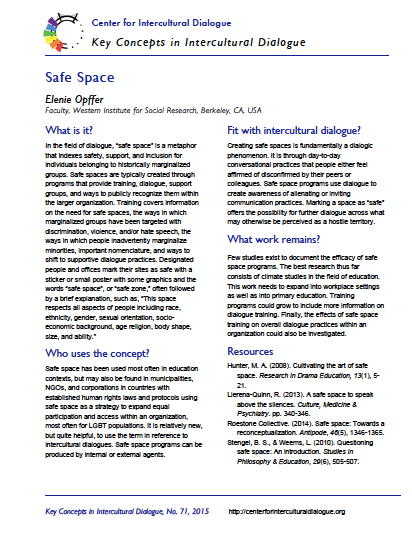 Continuing translations of Key Concepts in Intercultural Dialogue, today I am posting KC71: Safe Space, which Elenie Opffer wrote for publication in English in 2015, and which Candost Aydın has now translated into Turkish.
Continuing translations of Key Concepts in Intercultural Dialogue, today I am posting KC71: Safe Space, which Elenie Opffer wrote for publication in English in 2015, and which Candost Aydın has now translated into Turkish.
As always, all Key Concepts are available as free PDFs; just click on the thumbnail to download. Lists of Key Concepts organized alphabetically by concept, chronologically by publication date and number, and by languages into which they have been translated, are available, as is a page of acknowledgments with the names of all authors, translators, and reviewers.
 Opffer, E. (2022). Safe space [Turkish]. (C. Aydın, trans). Key Concepts in Intercultural Dialogue, 71. Retrieved from: https://centerforinterculturaldialogue.org/wp-content/uploads/2022/08/kc71-safe-space_turkish-1.pdf
Opffer, E. (2022). Safe space [Turkish]. (C. Aydın, trans). Key Concepts in Intercultural Dialogue, 71. Retrieved from: https://centerforinterculturaldialogue.org/wp-content/uploads/2022/08/kc71-safe-space_turkish-1.pdf
If you are interested in translating one of the Key Concepts, please contact me for approval first because dozens are currently in process. As always, if there is a concept you think should be written up as one of the Key Concepts, whether in English or any other language, propose it. If you are new to CID, please provide a brief resume. This opportunity is open to masters students and above, on the assumption that some familiarity with academic conventions generally, and discussion of intercultural dialogue specifically, are useful.
Wendy Leeds-Hurwitz, Director
Center for Intercultural Dialogue

This work is licensed under a Creative Commons Attribution-NonCommercial-NoDerivatives 4.0 International License.





